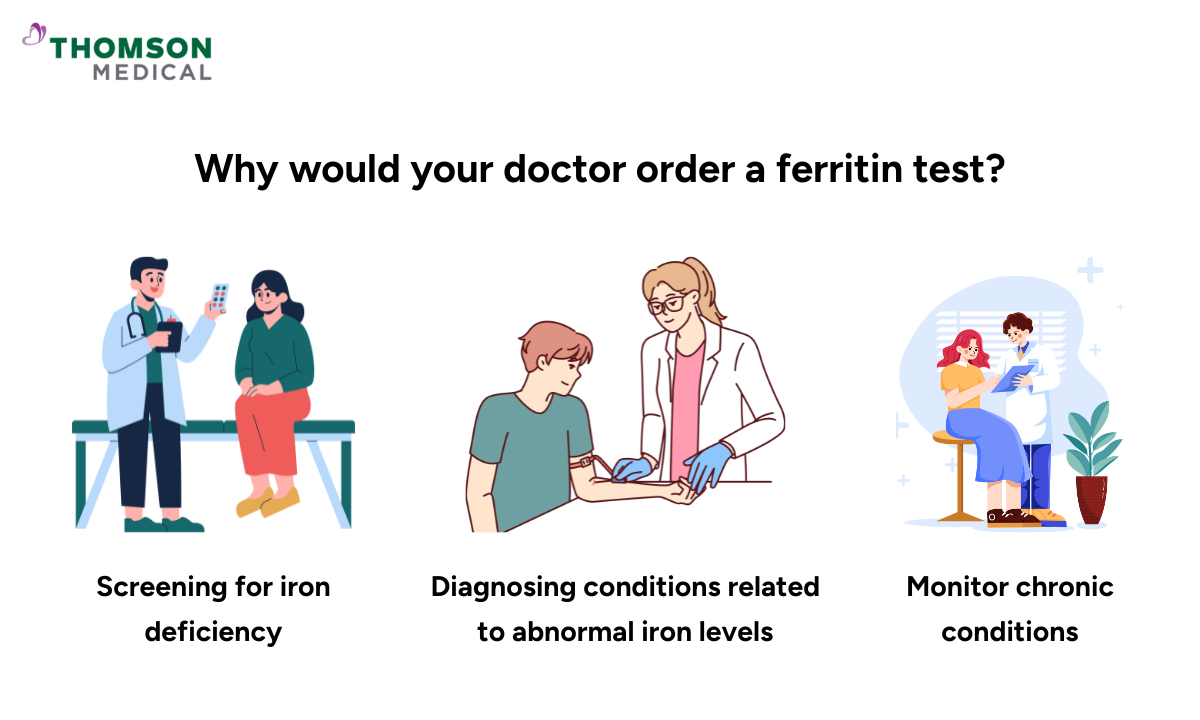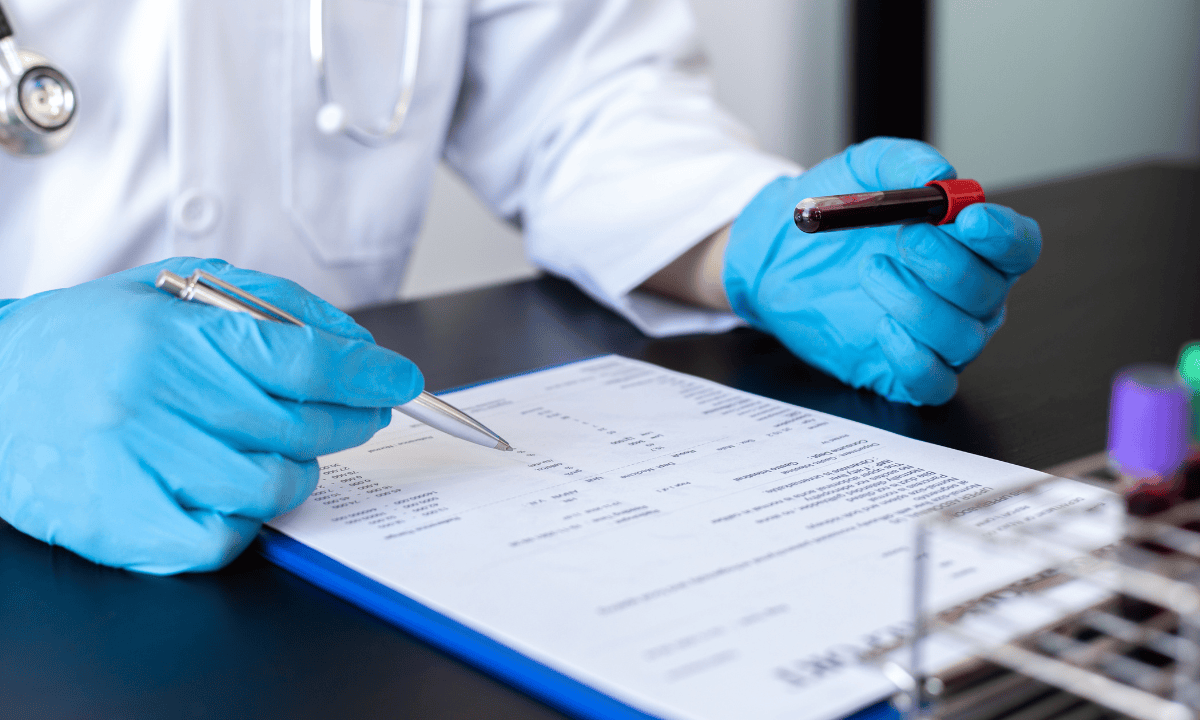What is a ferritin test?
The ferritin test, also known as the serum ferritin test, is a blood test that measures the level of ferritin in your blood. Ferritin is a protein that stores iron in your body and releases it when your body needs to make more red blood cells.
This test helps assess the amount of iron stored in your body. If the ferritin test shows that blood ferritin levels are low, this means that iron stores in the body are low, which may lead to iron deficiency anaemia. However, if the ferritin test shows high ferritin levels, this could mean that there is inflammation in your body.
In Singapore, the ferritin blood tests are widely available in hospitals, polyclinics, and private clinics. They can be performed either as stand-alone diagnostic tests or as part of health screening packages tailored to your medical needs.
Why would your doctor order a ferritin test?

A ferritin test is used to assess whether your body is storing a healthy amount of iron. Your healthcare professional uses it as a screening tool to look for signs of abnormal iron before symptoms develop.
Here are some common reasons why your healthcare professional may order this blood test, including:
Screening for iron deficiency, especially if you're at high risk due to:
Heavy menstrual bleeding
Pregnancy
Being underweight
Having problems absorbing nutrients, such as inflammatory bowel disease
Having a history of certain gastrointestinal (GI) surgeries.
Diagnosing or ruling out conditions related to abnormal iron levels, including:
Haemochromatosis, a condition in which the body absorbs and stores too much iron (also called iron overload disorder).
Iron deficiency anaemia is a condition in which there are too few red blood cells due to low iron levels.
Restless legs syndrome, a tingling or burning sensation in the legs that may be caused by iron deficiency
Adult-onset Still's disease (also called adult-onset Still's disease or AOSD) is a rare condition that causes joint pain, fever, and rash.
Monitoring chronic conditions that affect iron levels, including:
Cancer
Kidney disease
Autoimmune diseases
Liver disease
Other inflammatory disorders
Why do I need a ferritin blood test?
You may need this test if you're experiencing symptoms of low or high levels of ferritin, such as:
Symptoms of low ferritin levels include:
Fatigue or weakness
Shortness of breath
Dizziness
Irregular (arrhythmia) or rapid heartbeat (tachycardia)
Pale skin
Symptoms of high ferritin levels include:
Fatigue
Joint pain (especially in knees or hands)
Loss of sex drive
Erectile dysfunction (ED)
Unexplained weight loss.
Loss of body hair.
Abdominal pain
You may also need a ferritin test if a complete blood count (CBC) test indicates that you have low haemoglobin (the protein that carries oxygen throughout the body) or haematocrit (the amount of your blood that is made up of red blood cells) levels.
If you are experiencing any of the mentioned symptoms, request an appointment with Thomson Medical. Our specialists can assist with further diagnosis, including a ferritin blood test, to determine the underlying cause of your symptoms and provide a tailored treatment plan.
How do I prepare for a ferritin test?
You don't need to do anything special before the procedure. However, if your blood sample is used for other tests, you may be advised to fast for 8–12 hours before the test.
It is also important to tell your doctor about any supplements or medications you’re taking, such as iron supplements, as these may affect the test results.
What should I expect during the test
The ferritin test itself is a simple blood draw; your healthcare provider only needs to take a small amount of blood from a vein in your arm.
Before inserting the needle to draw your blood, the puncture area will be sterilised with an antiseptic to prevent infection. The needle is then inserted into your vein to collect it in a blood vial; the entire procedure usually takes less than five minutes.
Once the sample is collected, the needle is removed, and a piece of gauze and a bandage will be placed over the puncture site. After that, your blood sample is sent to a lab for analysis. Your results will usually be available within one or two days.

Ferritin test result
Based on the results of your ferritin blood test, your healthcare provider can determine whether your ferritin level is normal, low, or elevated. The result is measured in nanograms per millilitre (ng/mL), and normal ferritin levels vary according to age and gender:
Infants: 25–200 ng/mL
Children (1–5 years): 20–80 ng/mL
Children (6–12 years): 30–90 ng/mL
Men: 24–336 ng/mL
Women: 11–307 ng/mL
Low ferritin levels
If your results are below the normal range, this may be a sign of iron deficiency, which can lead to a lack of red blood cells in your body. To confirm the results, your healthcare provider may order additional blood tests to compare them and determine the extent of iron deficiency anaemia.
Treatment for low ferritin levels often involves taking iron supplements and treating the underlying cause of iron loss. Your healthcare provider may also do an assessment to see if your body is absorbing iron from your diet properly.
High ferritin levels
Elevated ferritin levels can indicate excess iron storage in the body, often due to conditions such as:
Chronic conditions such as autoimmune diseases and diabetes.
Taking too many iron supplements.
Repeated blood transfusions.
Hyperthyroidism (overactive thyroid).
Adult-onset Still's disease.
Damage to your spleen, bone marrow or liver.
Rheumatoid arthritis or another ongoing condition that causes inflammation.
Cancer, such as Hodgkin's lymphoma or leukaemia.
If your ferritin test results are lower or higher than normal, it doesn't necessarily mean you have a medical condition. Other factors, such as diet and inflammatory health conditions, can affect ferritin levels.
If your ferritin levels are higher or lower than the normal range, don't hesitate to consult a doctor. Request an appointment with Thomson Medical for further evaluation and recommendations based on your medical conditions.
Ferritin test costs in Singapore
In Singapore, a ferritin test can be performed at a hospital, polyclinic, or private clinic. The cost of this blood test depends on whether it's performed as a standalone test or as part of a health screening package, as well as the choice of medical facility.
Unfortunately, MediSave doesn't cover ferritin blood tests unless they are part of an approved chronic disease management programme or include certain subsidised health screenings. A stand-alone ferritin test or a test included in general health screening packages is not eligible.
For detailed fee information and payment options, please consult your healthcare provider directly. Request an appointment with our specialists at Thomson Medical today for a detailed price breakdown and a personalised care plan.
Are there any risks to the test?
The ferritin test is a very low-risk procedure, as it only requires a sample of your blood. However, you may experience some minor discomfort, such as when blood is taken directly from a vein.
Mild pain or discomfort around the punctured area.
A slight sting during the needle insertion or removal.
Dizziness due to the withdrawal of blood.
Slight bruising or bleeding at the needle insertion site, especially if you're on blood thinners.
FAQ
What is the normal ferritin level based on age?
Normal ferritin levels vary according to age and gender:
Infants: 25–200 ng/mL
Children (1–5 years): 20–80 ng/mL
Children (6–12 years): 30–90 ng/mL
Men: 24–336 ng/mL
Women: 11–307 ng/mL
Your healthcare provider will interpret your results based on your specific health conditions and other relevant factors.
What will happen if ferritin is low?
If ferritin is low, it suggests that your body has low iron stores, which can lead to iron deficiency anaemia. Symptoms of this condition include:
Fatigue
Weakness
Pale skin
Shortness of breath
Dizziness
Treatment usually includes iron supplementation and addressing the root cause of the deficiency.
What will happen if the ferritin level is high?
Elevated ferritin levels suggest excess iron storage in your body, which may be caused by various medical conditions, including:
Chronic inflammatory conditions
Excessive iron supplementation
Repeated blood transfusions
Hyperthyroidism
Adult-onset Still's disease
Liver, spleen or bone marrow damage
Rheumatoid arthritis or other inflammatory conditions
Certain cancers, such as Hodgkin's lymphoma or leukemia
High ferritin levels can also cause symptoms like fatigue, joint pain, reduced sex drive, unexplained weight loss, abdominal pain, and loss of body hair.
What causes low ferritin?
Low ferritin levels are primarily caused by:
Iron deficiency (due to insufficient intake or poor absorption).
Chronic blood loss, such as from heavy menstruation or gastrointestinal bleeding.
Pregnancy, which increases iron demands.
Certain gastrointestinal conditions that impair iron absorption, like coeliac disease or Crohn's disease.
What is the difference between iron and ferritin?
Iron is a mineral your body needs to make haemoglobin, the protein in red blood cells that carries oxygen around your body. Ferritin is a protein that stores iron in your body and releases it when needed to maintain iron levels in your body.
Think of ferritin as your body's iron store. If your ferritin levels are low, it means that your iron stores are depleted, even if you haven't yet developed iron deficiency anaemia.
How do you treat low ferritin?
To increase ferritin levels, you need to treat the underlying cause of iron deficiency:
Iron supplementation: Your doctor may recommend oral or intravenous iron supplements.
Dietary changes: Eat iron-rich foods, such as red meat, leafy greens, beans, and fortified cereals.
Treat underlying conditions: If low ferritin is due to chronic blood loss or absorption problems, your doctor will work to treat these conditions as well.
Your healthcare provider will create a personalised treatment plan based on the cause and severity of your low ferritin levels.
The information provided is intended for general guidance only and should not be considered medical advice. For personalised recommendations based on your medical conditions, request an appointment with Thomson Medical.
For more information, contact us:
Thomson Specialists Paragon (Health Screening)
- Mon - Fri: 8.30am - 5.30pm
- Sat: 8.30am - 12.30pm
Call: 6735 0300
Request a Health Screening